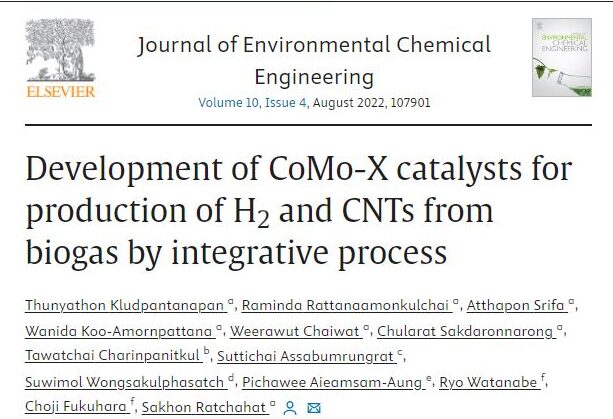Abstract
In this study, catalytic conversion of biogas into hydrogen and carbon nanotubes is investigated using an integrative process of dry reforming and methane decomposition. The catalytic improvement of cobalt catalysts promoted with various promoters: Mo, Ce, Zr, W, and Ca, is examined to discover the best combination that is resistant to a metal sintering. The addition of Mo shows an improved catalyst stability due to an enhanced metal-support interaction, avoiding metal sintering. The current process shows a remarkable CO2 conversion of 99.4% and a high CH4 conversion of 95.8%, while the gaseous products comprise of H2 up to 77%v/v at 900 °C, GHSV of 4500 ml/g-h. The long-term stability test for 7 h shows that the catalysts promoted with Mo, Zr, and W could provide almost complete CO2 conversion at 900 °C and under a high GHSV of 45,000 ml/g-h. The analysis of spent catalysts shows that deposited carbon composed of well-structured multi-walled carbon nanotubes (MWCNTs) with high graphitization (IG/ID = 2.14), compared to the commercial CNTs (IG/ID = 0.74). The as-synthesized CNTs could achieve 91%w/w purity without any purification. The process test at high temperature of 1000 °C, provides higher graphitization (IG/ID = 3.76) with compensation of lower yield of CNTs. This integrative process demonstrates a promising route to completely convert a renewable biogas into high-value products such as hydrogen and carbon nanotubes with less production of wastes.
The article can be accessed in https://www.sciencedirect.com/science/article/abs/pii/S2213343722007746

















